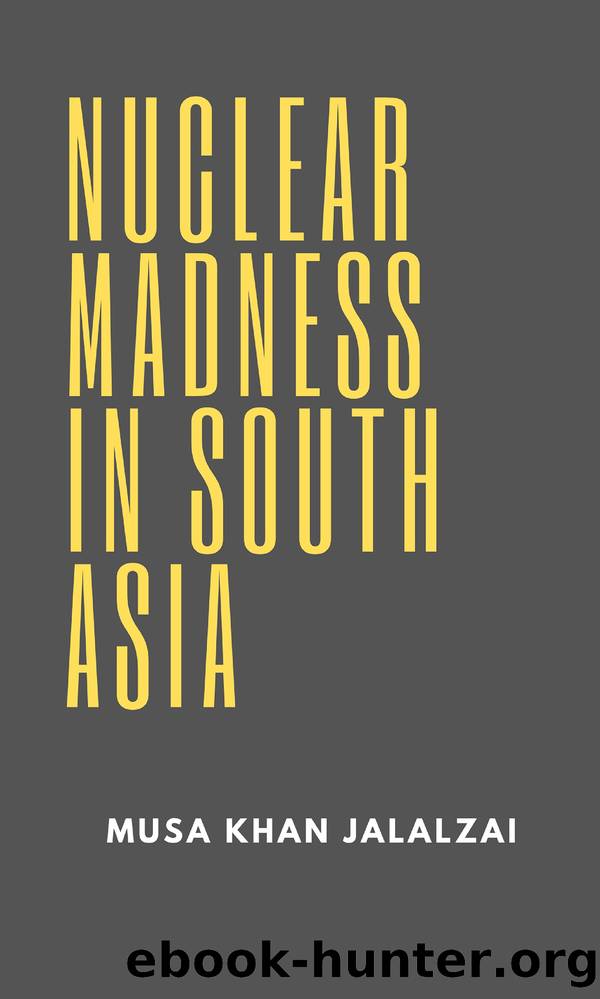Nuclear Madness in South Asia by Musa Khan Jalalzai

Author:Musa Khan Jalalzai [Jalalzai, Musa Khan]
Language: eng
Format: epub
Tags: Nuclear Warfare, Military, Political Science, History, Geopolitics, General
ISBN: 9789389620788
Google: UdoDEAAAQBAJ
Goodreads: 54689110
Publisher: VIJ BOOKS INDIA
Published: 2020-10-01T00:00:00+00:00
Chapter 6
The Twenty Yearsâ Crisis of Nuclear South Asia, 1998â2018: A Workshop Report
Zia Mian a, A. H. Nayyara and M. V. Ramana b
Abstract
In May 2018, the Liu Institute for Global Issues, part of the School of Public Policy and Global Affairs at the University of British Columbia, together with Princeton Universityâs Program on Science and Global Security ran a workshop on the twenty years since the May 1998 nuclear weapons tests by India and Pakistan. The workshop addressed three broad themes central to understanding nuclear dangers in South Asia: how to understand South Asian nuclear dynamics since 1998, the present and near future of nuclear South Asia, and finally the scope for civil society-led change in nuclear South Asia.
Keywords: India; Pakistan; nuclear weapons; nuclear crisis; deterrence; peace movement
Introduction
Twenty years ago, over a period of three weeks in May 1998, India and Pakistan carried out a series of nuclear weapon tests. There were tests on 11 May and 13 May 1998 by India, one of which was claimed to be a test of a two-stage thermonuclear weapon. Indiaâs Prime Minister, Atal Bihari Vajpayee of the Hindu nationalist party Bharatiya Janata Party, which had come to power only two months earlier, later said âThese tests were essential for ensuring a credible nuclear deterrent for Indiaâs national security in the foreseeable future.â1 Then on 28 May and 30 May 1998, Pakistan carried out its nuclear weapon tests. Prime Minister Nawaz Sharif of the conservative nationalist Pakistan Muslim League, who had taken office in 1997, said Pakistan âfelt compelled to acquire a matching capabilityâ and that the tests were meant to âestablish nuclear deterrenceâ and âserved the cause of peace and stability in our region.â2
On 6 June 1998, the United Nations Security Council unanimously passed Resolution 1172, which condemned the tests and expressed deep concern at the risk of a nuclear arms race in South Asia. It called on Pakistan and India âimmediately to stop their nuclear weapon development programmes, to refrain from weaponisation or from the deployment of nuclear weapons, to cease development of ballistic missiles capable of delivering nuclear weapons and any further production of misssile material for nuclear weapons, to confirm their policies not to export equipment, materials or technology that could contribute to weapons of mass destruction or missiles capable of delivering them and to undertake appropriate commitments in that regard.â The Resolution also urged âIndia and Pakistan to exercise maximum restraint and to avoid threatening military movements, cross-border violations, or other provocations in order to prevent an aggravation of the situation.â3
The two countries announced a moratorium on further nuclear weapon testing. There were no subsequent commitments to further limit nuclear weapon programs. There initially was widespread public support for the nuclear tests in both countries, with most political parties and much of the media in India and Pakistan largely supportive of the tests. Over time, the early public displays of enthusiasm for nuclear weapons have subsided into lacklustre commemorations and sporadic media coverage of the anniversary of the nuclear weapon tests of 1998.
Download
This site does not store any files on its server. We only index and link to content provided by other sites. Please contact the content providers to delete copyright contents if any and email us, we'll remove relevant links or contents immediately.
What's Done in Darkness by Kayla Perrin(25485)
Shot Through the Heart: DI Grace Fisher 2 by Isabelle Grey(18206)
Shot Through the Heart by Mercy Celeste(18150)
The Fifty Shades Trilogy & Grey by E L James(17766)
The 3rd Cycle of the Betrayed Series Collection: Extremely Controversial Historical Thrillers (Betrayed Series Boxed set) by McCray Carolyn(13176)
The Subtle Art of Not Giving a F*ck by Mark Manson(12888)
Scorched Earth by Nick Kyme(11821)
Stepbrother Stories 2 - 21 Taboo Story Collection (Brother Sister Stepbrother Stepsister Taboo Pseudo Incest Family Virgin Creampie Pregnant Forced Pregnancy Breeding) by Roxi Harding(11003)
Drei Generationen auf dem Jakobsweg by Stein Pia(10205)
Suna by Ziefle Pia(10174)
Scythe by Neal Shusterman(9247)
International Relations from the Global South; Worlds of Difference; First Edition by Arlene B. Tickner & Karen Smith(8597)
Successful Proposal Strategies for Small Businesses: Using Knowledge Management ot Win Govenment, Private Sector, and International Contracts 3rd Edition by Robert Frey(8403)
This is Going to Hurt by Adam Kay(7672)
Dirty Filthy Fix: A Fixed Trilogy Novella by Laurelin Paige(6444)
He Loves Me...KNOT by RC Boldt(5791)
How to Make Love to a Negro Without Getting Tired by Dany LaFerrière(5364)
Interdimensional Brothel by F4U(5296)
Thankful For Her by Alexa Riley(5146)
